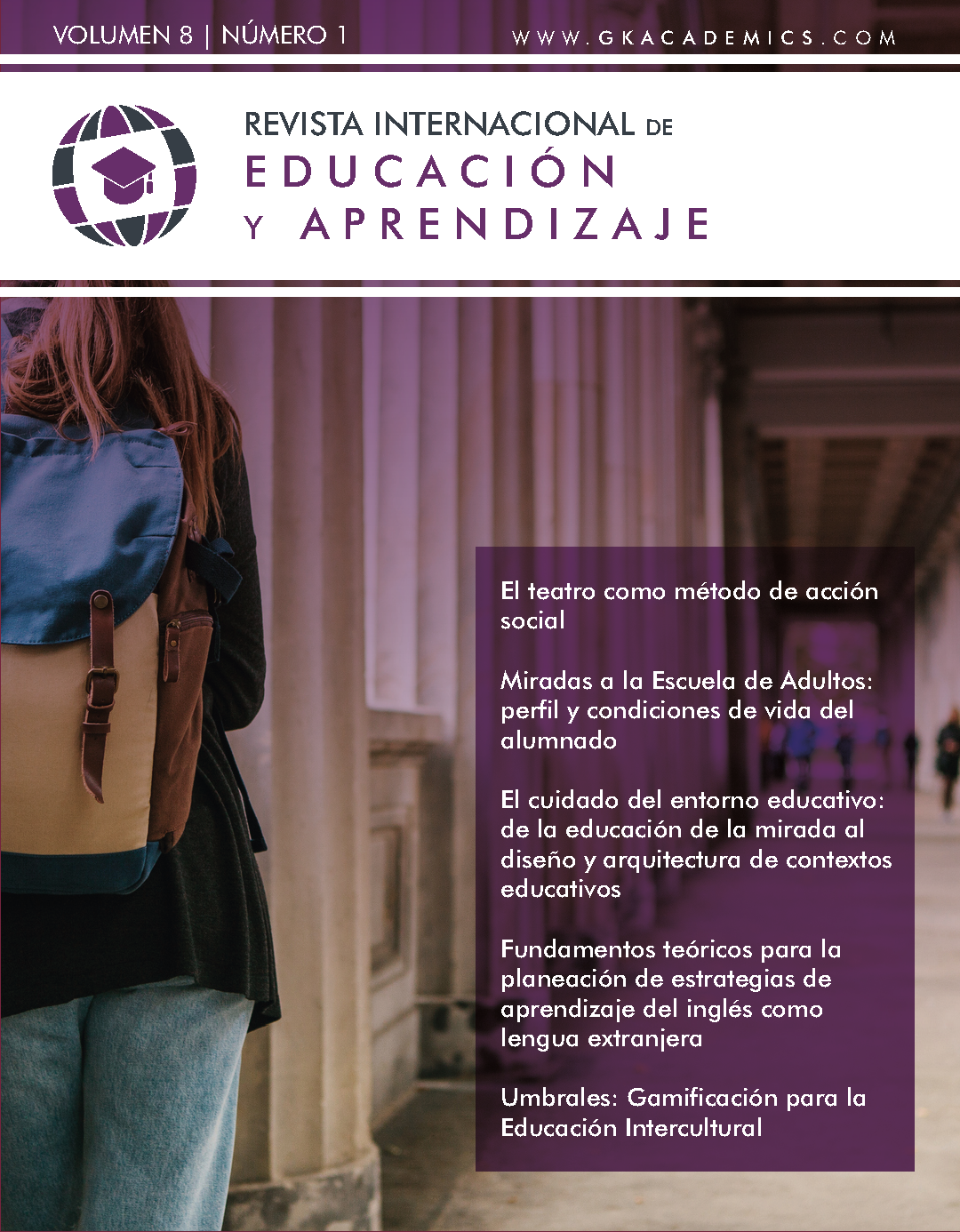The Theater as a Method of Social Action
DOI:
https://doi.org/10.37467/gka-revedu.v8.2494Keywords:
Social Action, Social Intervention, Social Theater, Theater of the OppressedAbstract
This theoretical research with methodology based on the collection and documentary analysis focuses on the innovative perspective of the practical application of the Social Theater or Theater of the Oppressed as a tool for socio-educational intervention and of transformation and development of the participants. Therefore, this work aims to describe the Theater of the Oppressed and its different types, techniques, evolution and characteristics in order to establish a practical and innovative link from its application in social interventions and determine the possible benefits that this entrepreneurial modality can offer in society.
Downloads
Global Statistics ℹ️
|
1340
Views
|
4293
Downloads
|
|
5633
Total
|
|
References
Abellán, J. (2001). Boal contra Boal. Barcelona (España): Institut del Teatre.
Alvarado, I. y Álvarez, G. (2016). El Teatro Foro como herramienta entre el diagnóstico y la programación comunitaria. La mirada antropológica y el desarrollo comunitario se encuentran en Taco (Tenerife). En Respuestas transdisciplinares en una sociedad global. Aportaciones desde el Trabajo Social. II Congreso del Trabajo Social. Logroño.
Baraúna, T y Motos, T. (2009). De Freire a Boal. Ciudad Real: Ñaque Editora.
Bendelak, O. (s.f) Teatro Legislativo: ejercicio pleno de la ciudadanía. Recuperado de: https://www.ctorio.org.br/home/teatro-legislativo-exercicio-pleno-da-cidadania/ . Visitado por última vez en: 21 de junio de 2019.
Boal, A. (1980). Teatro del Oprimido: teoría y práctica. México: Nueva Imagen.
Boal, A. (1980) Stop! C’est magique. París: Hachette.
Boal, A. (1982). Técnicas latinoamericanas de teatro popular. México: Nueva Imagen.
Boal, A. (2000) Hamlet e o filho do padeiro: memórias imaginadas. Rio de Janeiro: Record.
Boal, A. (2004). El arcoiris del deseo. Barcelona: Alba.
Boal, A. (2006). The Aesthetics Of the Opressed. London: Routhledge. DOI: https://doi.org/10.4324/9780203969830
Boal, A. (2009a). A estética do oprimido. Rio de Janeiro: Garamond.
Boal, A. (2009). Teatro del Oprimido. Barcelona: Alba editorial.
Boal, A. (2012). La Estética del oprimido. Reflexiones errantes sobre el pensamiento desde el punto de vista estético y no científico. Barcelona: Alba Editorial.
Cortés, F. y Gracia, M. (2016). Dumpsterart Project: Teatro Social y Photovoice como herramientas de empoderamiento profesional. En Respuestas transdisciplinares en una sociedad global. Aportaciones desde el Trabajo Social. II Congreso del Trabajo Social. Logroño.
De Vicente, C. (2009, julio). Augusto Boal. El teatro más allá de Brecht. Diagonal Net (en línea). Disponible en: https://www.diagonalperiodico.net/culturas/augusto-boal-teatro-mas-alla-brecht.html
Esterri, N. (2004). El Teatro Social. Educación Social: Revista de intervención socioeducativa (28), pp.67-82. Recuperado de:https://dialnet.unirioja.es/servlet/articulo?codigo=1065783
Forcadas, J. (2012). Praxis del Teatro del Oprimido, Barcelona: Impremta MRR. Recuperado de https://www.patothom.org/PDFs/PraxisTeatroOprimido.Forcadas.pdf
Freire, P. (2000). Cartas a quien pretende enseñar. Buenos Aires: Siglo Veintiuno.
Freire, P. (1995). Pedagogía del Oprimido. Madrid: Siglo Veintiuno.
Lladó, A. (2017). El Teatro del Oprimido como herramienta de intervención social. Trabajo de grado, Educación social, Universitat de les Illes Balears, Islas Baleares.
Moreno, J. (2016) Proyecto Dinamiz-arte: proyecto de dinamización cultural a partir de un espacio de teatro compartido con personas con discapacidad. En Respuestas transdisciplinares en una sociedad global. Aportaciones desde el Trabajo Social. II Congreso del Trabajo Social. Logroño.
Motos, T. (2017) El Teatro del Oprimido de Augusto Boal. Trabajo de Máster, Teatro Aplicado. Recuperado de: http://www.postgradoteatroeducacion.com/wp-content/uploads/2017/01/1Teatro_Oprimido_Master_TA_febrero_2017.pdfcontent/uploads/2017/01/1Teatro_Oprimido_Master_TA_febrero_2017.pdf
Motos, T., Navarro, A., Ferrandis, D. y Stronks, D. (2013) Otros escenarios para el teatro. Ciudad Real: Ñaque.
Ocampo,O. J. (2008). Paulo Freire y la Pedagogía del Oprimido. Rudecolombia, Vol.10, pp. 57-72.
Puga, I. (2012). Teatro del Oprimido: dispositivo crítico para la Psicología Social Comunitaria. Sociedad & Equidad, (3), pp.195-201. DOI: https://doi.org/10.5354/0718-9990.2012.18251
Ramírez, M. (2016). El teatro como herramienta para la intervención social: una aproximación desde el trabajo social. Trabajo de grado, Trabajo Social, Universidad de Valladolid.
Richmond, M. (1995). Caso social individual. Madrid: TALASA.
Santos, B. (s.f.) Centro de Teatro del Oprimido. Métodos. Recuperado de: https://ctorio.org.br/home/metodo/. Visitado por última vez en: 15 de junio de 2019.
Somers, J. (2009). Drama and well-being. Narrative theory and use of interactive theatre in raising mental health awareness en Somers, J. Dramatherapy and Social Theatre (pp.193-202) (Vol.I). Londres: Necesary Dialogues.
Taylor, P. (2006). Applied Theatre/Drama: Ane-debate in 2004: Wiewpoints. RIDE: Research in Drama Education, 11, 1, pp. 90-95. DOI: https://doi.org/10.1080/13569780500437960
Tejada, J. (1998). Los agentes de la innovación en los centros educativos. Archidona: Aljibe.
Vega, P. (2009). Posibilidades del teatro en la intervención social. Orientaciones para la práctica. Recuperado de: http://www.trabajosocialmalaga.org/archivos/revista_dts/55_1.pdf
Downloads
Published
How to Cite
Issue
Section
License
Those authors who publish in this journal accept the following terms:
-
Authors retain copyright.
-
Authors transfer to the journal the right of first publication. The journal also owns the publishing rights.
-
All published contents are governed by an Attribution-NoDerivatives 4.0 International License.
Access the informative version and legal text of the license. By virtue of this, third parties are allowed to use what is published as long as they mention the authorship of the work and the first publication in this journal. If you transform the material, you may not distribute the modified work. -
Authors may make other independent and additional contractual arrangements for non-exclusive distribution of the version of the article published in this journal (e.g., inclusion in an institutional repository or publication in a book) as long as they clearly indicate that the work was first published in this journal.
- Authors are allowed and recommended to publish their work on the Internet (for example on institutional and personal websites), following the publication of, and referencing the journal, as this could lead to constructive exchanges and a more extensive and quick circulation of published works (see The Effect of Open Access).













